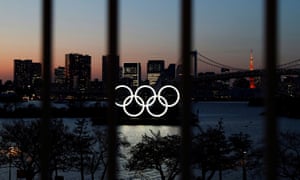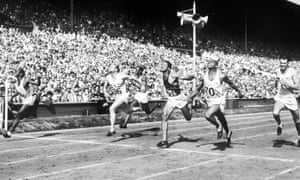Tokyo 2021 is golden chance to close Big Sport circus and give the Olympics back | Barney Ronay | Sport
Citius. Altius. Cancelled by a bat virus. In the end the decision to postpone the Olympic Games came as no surprise to anyone. Tokyo 2020 had struggled on manfully, like the last Japanese soldier still fighting the second world war from inside a small Pacific island copse in 1974. But there was never any doubt which way this was heading.
Global plague trumps global sport every time and the degree of delay and fudge was just a function of the political and financial capital involved, the need to erect sufficient litigation-shields and anti-blame mechanisms.
Nobody wants to be the general who announces defeat.
The suggestion is Tokyo 2020 may now be rescheduled for spring 2021. In the meantime sympathy will be felt most keenly for the athletes, as it will for everyone else whose hopes for the future, daily routine and basic means of subsistence have been ripped apart by the Covid-19 pandemic
Still, though. This is also a time for unvarnished truths. Whenever it does end up happening Tokyo 2020 will provide the usual mix of individual human inspiration and mild economic stimulus. But it will also – and we can say this now – be stuffed full of bullshit, revved up on the deeply phoney and self-serving Big Sport model, these four-yearly events that circle the globe like mobile city states clearing the fields, raiding the public stores, favouring the local Maharajahs with their magic dust.
The Olympic rescheduling is likely to cost an extra £2bn, indication in itself that the whole thing was already far too big. God only knows how that might look or feel in a time of global anxiety and deep economic depression. Is this a chance to do things differently?
It is tempting to imagine the old certainties might just be swept away in times of macro-disaster, that there is also a kind of freedom here. During the London Blitz, George Orwell wrote about the railings coming down from the capital’s private squares as the army took charge of all spare iron. Suddenly every squit and herbert and passerby could play in these previously shuttered spaces. Orwell imagined the squares staying like this, how a new egalitarianism might change life for everyone, an obsession with shared public land that also touched on his unshakable hatred of golf courses.

The iron railings went back up. These days the city is more opaque and unapproachable than ever before. But it doesn’t have to be like this. In Big Sport, as in so many areas of life, there is an opportunity here for a mass-correction, for a step-change in what we see as acceptable. Strip it back. Flush out the murky corners. Get rid of all the things you never needed anyway. Do we have the guts and the will to make it so?
Here’s a more cheerful digression. The question for Tokyo 2020 is simple enough. Does it want to end up looking like something along the lines of the great lost Nazi Fifa World Cup of 1942, a grandiose, rather misjudged footnote, overtaken by the world falling apart around it?
Or could it draw on the spirit and the practise of the Austerity Games of 1948, perhaps the most uplifting of all the modern Olympics, staged at a time when the world was still in chaos?
No new venues were built for those games. The Olympic torch came down the Thames in a rowing boat. Athletes arrived at Fenchurch Street station to be greeted by village-level bunting and were then housed eight to a room on tubular steel wartime beds.
Everyone looked thin and pale and desperately happy to be out running and jumping around. Harrison Dillard of the USA won the men’s 100m on a sodden cinder track that left him spattered with mud. Fanny Blankers-Koen won a thrilling women’s sprint double but almost missed the relay final because she’d popped out to buy a raincoat. The javelin took place by torchlight.

By all accounts it was joyful and cathartic and an experience that came from an entirely different place to the machine world of modern-day Big Sport, that profiteering global circus that constantly tells you this, sport, belongs to someone else, that it is simply a circus to be consumed at a price.
The Olympic Games is not the worst offender. It still offers those moments of individual inspiration. But it does also tend to amplify the vices of those who seek to stage it. Beijing was an astonishing show of nation-state power but it cost £40bn and most of its venues lie rotting. Greece 2004 helped kill the local economy. London 2012 was a triumph of styling, but left behind declining participation and an ever more passive populace. Rio 2016 was a wonderful case study in elite-level corruption.
Why propagate this? Why allow it to be the model? Nobody really likes the way Big Sport is arranged now, apart from the small minority that stand to benefit from it.
There is still an opportunity to reset, to take out the chaff and the profiteering hangers-on. To revolt, for example, against Fifa’s reserves of £1.5bn and demand that money be given back; or to get rid of the pernicious influence of gambling sponsors (if you need gambling to be interested in sport, you’re not interested in sport).
And beyond this to rewrite the terms of every competition to favour inclusion and access, to ask constantly how easy is it for every member of society to play and watch and enjoy this sport.
People will say this is impossible, that nothing can change. But does it really feel like that right now? Sport in the form it was intended, sport with the unhealthy additives taken away, sport in the spirit of London ’48 and Orwell’s railings. This is one thing we can still have.
